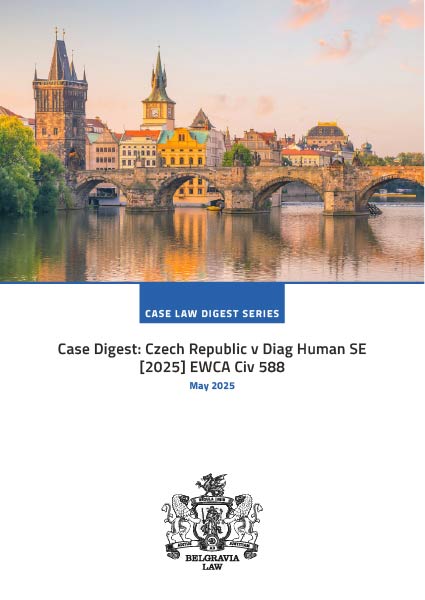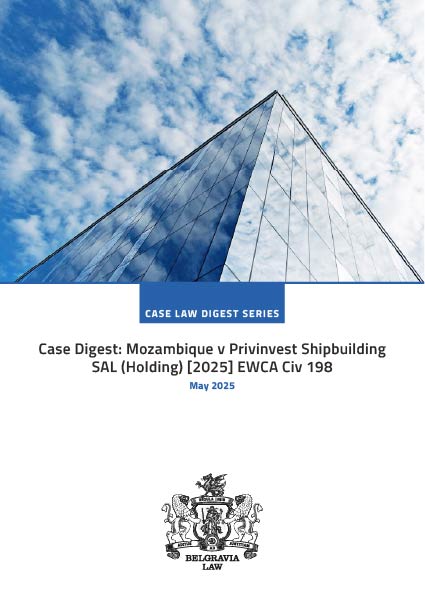Legal Updates In The UK
English Court Rules Settlement Agreement’s Exclusive Jurisdiction Clause Takes Precedence Over Prior Arbitration Provisions
In a significant ruling, the English High Court has clarified the relationship between competing dispute resolution clauses, particularly in cases where a settlement agreement follows earlier contracts with arbitration provisions. In Destin Trading Inc v Saipem SA [2025] EWHC 668 (Ch), the court dismissed an application to stay court proceedings under Section 9 of the Arbitration Act 1996.
The Court ruled that a new exclusive jurisdiction clause in a settlement agreement superseded earlier arbitration clauses in prior contracts. This decision confirms that when parties settle prior disputes through a new agreement, the jurisdiction clause in the settlement agreement will typically govern any related disputes, unless the intention to maintain prior arbitration clauses is explicitly stated.
Key Practical Takeaways
This case provides authoritative guidance on the interaction between competing dispute resolution clauses, particularly where a settlement agreement follows prior contracts with arbitration provisions. The court restated a commercially pragmatic approach: when parties enter into a later agreement to settle prior disputes and include a new jurisdiction clause, that clause will likely govern all related disputes as we advance, unless expressly carved out.
This has several implications in practice. First, when advising on settlement agreements, it is essential to consider whether parties intend to displace prior arbitration provisions. If not, the settlement terms must make that intention explicit. Second, this case underscores the importance of precise drafting. Broad jurisdiction clauses in settlement or termination agreements may unintentionally override previously agreed arbitral mechanisms, especially where the claims. However, referencing earlier contracts arises from misrepresentation or other issues tied to the settlement.
This decision also highlights the court’s willingness to prioritise procedural efficiency and avoid fragmented dispute resolution. It aligns with the judicial preference for ‘one-stop adjudication’, reducing the risks of inconsistent outcomes and promoting coherent dispute management strategies.
Case Background

Destin Trading Inc (“Destin”) and Saipem SA (“Saipem”) had a long-standing commercial relationship involving offshore oil and gas projects in Africa. Their dealings were governed by several frame agreements (the “Frame Agreements”), each of which incorporated Saipem’s general terms and conditions including an ICC arbitration clause seated in London. Disputes later arose regarding unpaid invoices, particularly under the ‘Congo River Crossing Project’, and in 2013 the parties entered into a settlement agreement (the “Settlement Agreement”). The Settlement Agreement included an exclusive jurisdiction clause in favour of the English courts and expressly terminated the previous Frame Agreements and released both parties from future claims arising from them.
In 2024, Destin brought a claim in the English courts, alleging it was induced to enter the Settlement Agreement by misrepresentations. Destin sought rescission of the Settlement Agreement and claimed restitution and damages. Saipem applied to stay Destin’s monetary claims under Section 9 of the Arbitration Act 1996 arguing that those claims arose under the Frame Agreements and had to be brought in ICC arbitration.
Court’s Decision
Andrew Lenon KC, sitting as a Judge of the High Court, refused to stay the proceedings. He held that the monetary claims, although referencing sums due under the earlier Frame Agreements, were in substance claims for deceit and restitution arising from the Settlement Agreement. The governing dispute resolution clause was therefore Clause 10 of the Settlement Agreement, which conferred exclusive jurisdiction on the English courts.
The court applied the reasoning in Monde Petroleum SA v Westernzagros Ltd [2015] EWHC 67 (Comm) (“Monde”) by analogy, noting that while Monde involved a termination agreement, similar principles apply to settlement agreements. When a settlement agreement is intended to bring earlier agreements (and related claims) to an end and contains a dispute resolution clause inconsistent with prior clauses, it will generally be construed as having a superseding or overriding effect. This reflects a shift in the ‘centre of gravity’ of the parties’ relationship to the settlement agreement itself.
The court rejected Saipem’s contention that the arbitration clauses in the Frame Agreements survived termination. It found that the parties intended to displace those clauses by agreeing to (among other things) the exclusive jurisdiction provision, an entire agreement clause and the express termination of the Frame Agreements, in the Settlement Agreement. Even applying the two-stage test from Mozambique v Privinvest [2023] UKSC 32 in alternative to Monde, the court held that Destin’s monetary claims were concerned with claims for damages for deceit inducing the Settlement Agreement, not claims under the earlier Frame Agreements. The stay application was therefore dismissed.
Conclusion
This ruling provides important guidance on the interaction between dispute resolution clauses in settlement agreements and earlier arbitration clauses. It is important to ensure that settlement agreements clearly outline the intended dispute resolution mechanisms to avoid potential conflicts with earlier agreements, particularly in complex commercial relationships.










